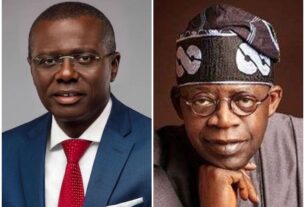By Akeem Awere
It is the first anniversary of President Bola Ahmed Tinubu’s administration. Yet, the edgy feeling which pervaded the Buhari Administration’s eight-year rule has continued unabated. Many within the country now regard the present situation as worse than what he inherited from his predecessor. Recall that in his inaugural speech of May 29th, 2023, the new President – Ashiwaju Bola Ahmed Tinubu promised the Nigerian people that his administration intends to “target a higher GDP growth and to significantly reduce unemployment”. He went further in his speech to promise that “budgetary reform stimulating the economy without engendering inflation will be instituted”. Finally, the President’s inauguration day pledge now given prominence by many is the one that states that “electricity will become more accessible and affordable to businesses and homes alike”
While one could reasonably agree with the Tinubu administration’s economic policy apologists that it would take some time for the benefits of new policies to kick in, considering decades of past mismanagement of the country’s economy, one could also out of compassion for the Nigerian impoverished masses argue that any economic policy to be adopted in their interest by the new administration should be one that is bespeckled with care, love and compassion, and not one that treats the common man like mere expendables. The consequence of this sympathetic wisdom is a tendency for critics to vigorously question President Bola Ahmed Tinubu’s economic policy which according to him is anchored on restructuring the economy by resetting certain key economic fundamentals via some aggressive deregulation programs. As part of the deregulation agenda, oil subsidy was removed on the president’s first day in office, followed shortly by the floating of the Naira which the government claimed was done to reflect its true value and attract investment into the country. Next in line was the increased ancillary fees levied by federal government-owned tertiary institutions. It’s no news that this new deregulation policy immediately precipitated a hyperinflation that further sunk into the depths of poverty a sizeable population already tottering at the brink of economic disaster. Despite the protests and widespread criticisms of the administration’s deregulation of the prices of certain key commodities by a cross-section of the Nigerian population, the government rode roughshod over the people’s agitation to impose a new regime of electricity tariff which saw the commodity hiked by almost three hundred percent. Specifically targeted by the government were the industrial hubs and certain residential areas the government claimed were receiving power supply for more than sixteen hours per day.
To alleviate the disappointments and furore generated by the economic hardship imposed on the masses by the administration’s new economic policy, the President wittingly compared the hardship the people were going through to the throes of labour experienced by a woman during childbirth. He indirectly justified the harsh economic policy by assuring a beleaguered populace that there would be light at the end of the tunnel, likening it to how the baby’s eventual birth brings untold joy to the parents and their families. It’s now almost one year of harrowing experience since the President found himself in the saddle and it is obvious that the nation is still not at ease. Yet some of his supporters are of the opinion that he deserved to be cut some slack by his administration’s critics. A very prominent Nigerian personality in the person of the former governor of the Central Bank of Nigeria and the newly reinstated Emir of Kano, HRH Alhaji Sanusi Lamido, has also lent his voice to this opinion. In their collective judgment, the administration’s supporters argue that one year is too short to deliver a verdict on President Tinubu’s administration’s performance.
However, while the President’s supporters were busy pleading for time and appealing for the people’s patience, the poverty space continues to widen with many individuals and families at the threshold of poverty falling into the poverty trap. Ironically, while the masses were being forced to make great sacrifices to restore the country’s economic glory, political class members were busy allocating humongous public resources to fund a luxurious lifestyle. Such was the allocation of the sum of one hundred and sixty million naira to import from abroad classy SUVs for each of the lawmakers that constitute the National Assembly and the budgeting of eighty billion naira of public money to fund some private citizens’ religious pilgrimages.
In addition, rent-seeking oligarchies have continued to exhibit a nonchalant attitude toward the plight of consumers by failing to fairly readjust the prices of their commodities whenever there were improvements in some key economic fundamentals. Cement’s price stands out here as a good example. To complicate matters, the palliative measures promised to cushion the effect of the hardship resulting from the overall economic policy were not honoured by the government. In a few places within the country, the distribution of palliatives merely took the form of skeletal operations, a complete travesty of the original plan. Along the line, many economically independent folks returned to a state of dependency while some were completely pauperized and compelled to live on alms. Also, in the heat of the criticism that followed the astronomical hike in ancillary fees of tertiary education, a controversial student loan scheme was proposed and subsequently signed into law by the federal government. While I give props to the Tinubu administration for this noble idea, one can only hope that the administering hands of this loan scheme would be honest and competent enough to fairly deliver the goals and objectives of the scheme, whenever it finally kicks off.
In the thick of the federal government’s deregulation policy, there have been strong demands by Organized Labour for wage increases to assuage the impacts of the current hyperinflation. However, in the course of a protracted negotiation that now appears to be deadlocked, Labour is insisting on a N500,000 minimum wage for Nigerian workers while the Federal government is offering a paltry sum of N54,000. However, from an economic standpoint, it remains a puzzle how mere wage increases would permanently solve the problem of cost-push inflation that is interwoven with a significant fall in the supply of essential commodities. There are clear indications that both aggregate demand and aggregate supply continue to hurt significantly within the economy due to decreasing purchasing power and dwindling productivity cum production capacity.
This brings us to the issue of national security. The state of insecurity in the country has now made it imperative for citizens to put more pressure on the government to work towards the decentralization of state security via the institution of state police within the country as this has continued to hurt farming while industrial production groans heavily under the impact of the unfavourable Naira exchange rate coupled with the poor state of infrastructure. Recently, traders’ collective confidence in the stability of the Naira value was tested by a short-lived spike in the Naira value. Despite the value gains made by the Naira within that short period, traders vehemently refused to adjust the prices of their commodities to reflect new currency values. Unfortunately, the Naira has since returned to its former undesirable trajectory. This reversion points to the fact that the Nigerian currency is yet to be within the zone of stability. Going by the latest foreign exchange rate figures, the Naira now exchange for a US dollar to N1,470.
A few weeks back, while addressing a horde of market sellers, the daughter of the president and the current Iyaloja of the Federal Republic of Nigeria, made a gentle appeal to market traders to allow the prices of their goods to reflect the temporary gains in the naira value. In what appeared like a display of filial affection for her father and patriotism for the nation, she threateningly alluded to the possibility of a raid on market places to fish out traders who have refused to bring down the prices of their commodities. Her request was generally rebuffed despite the threat. However, while one might admire her boldness in condemning profiteering and unbridled capitalism, one might also need to remind her that leaders at the helm of any country’s economic management should practice what they preach by leading their followers by example. In a country where the father of the Iyaloja presides over the most brutal capitalist economy in the history of Nigeria, it is not unlikely that her admonition would be seen as hypocritical.
Just recently, the Central Bank of Nigeria’s governor, Mr. Yemi Cardoso increased the benchmark interest rate by 150 basis points to 26.25% from 24.75% to moderate inflation which reached 33.69% in April 2024 according to the National Bureau of Statistics (NBS). However, the snag of the increase in the CBN’s interest rate to address inflation is whether it will end up as a catch-22 situation. This is because the resultant rise in commercial banks’ lending rates to entrepreneurs will lead to higher costs of production and ultimately price increases that could further intensify organized labour’s demand for higher wages.
It is almost a year into the President’s tenure, and the achievements that could be touted by his administration so far are the very intangible ones. Inflation and unemployment figures remain at unprecedented levels while our Gross Domestic Product continues to crawl in the face of currency depreciation, usurious interest rates, insecurity and poor state of infrastructures. The people continue to groan and lament under one of the most distressing economic conditions Nigerians have ever experienced. In all of these, the President and his men have continued to sell the idea of a ‘renewed hope’ to the citizenry. As the people continue to bear the insufferable birth pangs and await the birth of the “beautiful baby’ President Tinubu assured them on his 2023 inauguration day, there is widespread fear among the masses as to whether the promises made to them would not in three years from now, turn out to become another castle built in the air.

Akeem Awere is a news and current affairs analyst.






